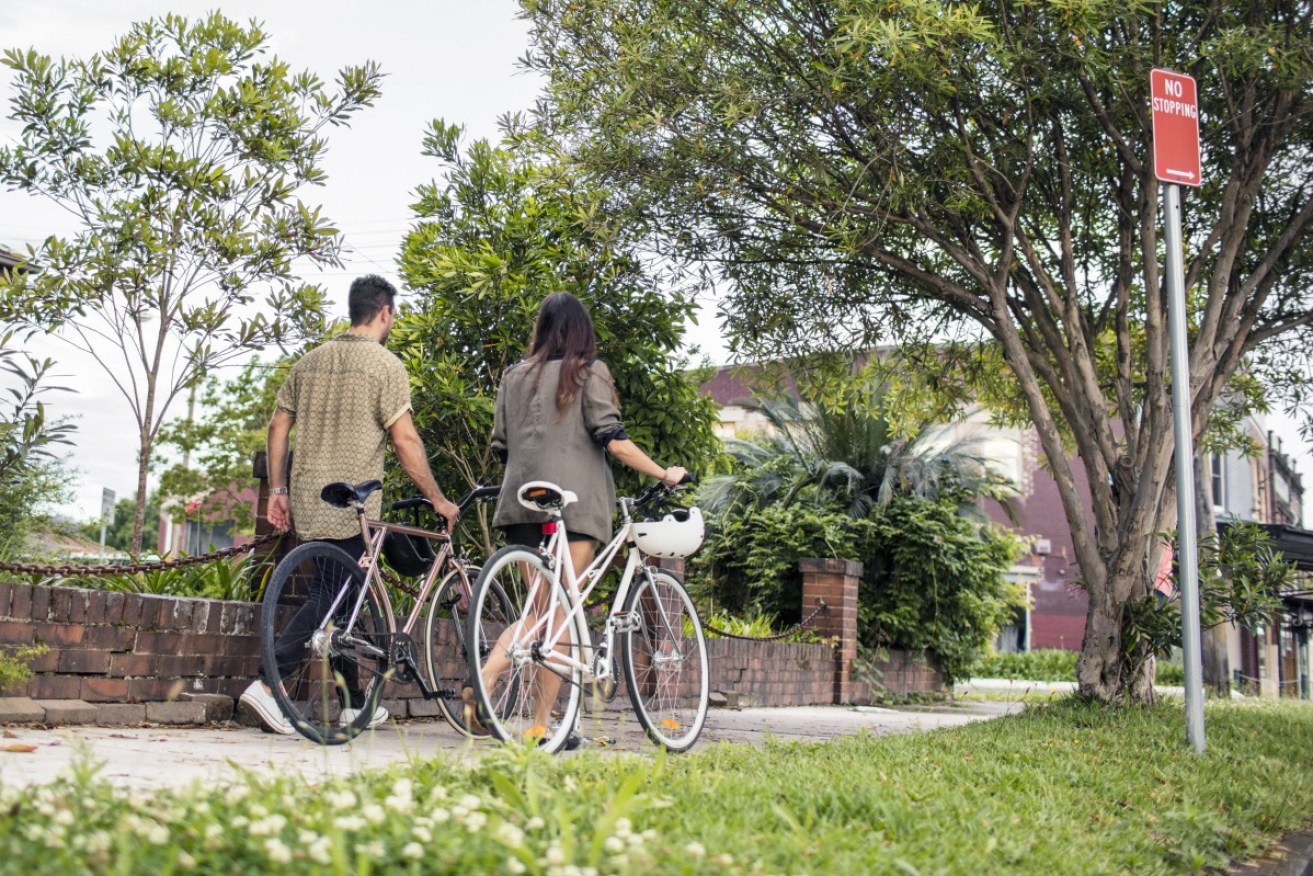How long it takes to save a deposit

Sydney and Melbourne are getting out of reach for first time buyers. Photo: Getty
First time home buyers may want to avoid the big cities and find love if they intend to qualify for a loan anytime soon.
New data suggests even a hard-saving couple will need 4.9 years to squirrel away a deposit for a median-priced house in one of the capital cities.
The national figure is only slightly better at 4.4 years, according to a Bankwest report published on Thursday.
The average Australian couple needs a down payment of $103,600 to get a loan for a median-priced home — up from $99,700 in 2015, $93,800 in 2014, and $87,600 in 2013.
Click here to jump to your state: New South Wales | Victoria | South Australia | Queensland | Western Australia | Tasmania
Despite the Reserve Bank slashing the official cash rate to its lowest level ever, it is actually getting harder for first time buyers to enter the market, according to Bankwest’s executive general manager of retail, Andrew Whitechurch.
“Low interest rates, sluggish wage growth, and rising house prices are making it increasingly difficult for first time buyers to get a foot on the property ladder in most capital cities in Australia,” he noted in the report.
Recent data from the Australian Bureau of Statistics confirms it really is harder to get into the market for the first time.
The reason ultra-low rates aren’t helping is that they have ignited a bidding war, Mr Whitechurch said.
“While lower interest rates are beneficial for those who already own their homes in the form of lower loan repayments and interest, they can also bring more buyers into the market and this drive up house prices, making home ownership less affordable for first time buyers.”
Housing affordability has been one of the most contentious issues of 2016. Only last week, a parliamentary committee stacked with Coalition MPs was criticised for issuing a report that made very few recommendations to fix the problem.
 The numbers from CoreData assume a couple is saving 20 per cent of their pre-tax yearly income and putting it into an online savings account; that the deposit is 20 per cent of the purchase price; and that the home is median priced.
The numbers from CoreData assume a couple is saving 20 per cent of their pre-tax yearly income and putting it into an online savings account; that the deposit is 20 per cent of the purchase price; and that the home is median priced.
CoreData made the calculations based on data from between 2011 and 2016. So for a couple starting to save now, the task will only get tougher if house prices continue to rise and wage growth remains sluggish.
New South Wales
Statewide: 5.7 years ($138,600)
Sydney: 8.4 years ($214,600)

Melbourne is looking a lot more affordable at the moment. Photo: The New Daily
No surprises here. Sydney requires the longest savings time of any capital city, up six months since 2015. And NSW is the longest of any state — up five months.
Most (53 per cent) of Sydney suburbs now require couples to save for more than 10 years, up from 44 per cent in 2015.
The state also claimed eight of the 10 least affordable suburbs: Strathfield (17.9 years), Mosman (17.4), Woollahra (16.9), Waverley (15.9), Burwood (15.2), Hunters Hill (15.2), Manly (14.4) and Willoughby (14.4).
Victoria
Statewide: 4.7 years ($108,900)
Melbourne: 6.2 years ($148,600)
Victoria came in second behind NSW, with an average saving time of 4.7 years, up slightly from 4.4 years in 2015.
Overall, Melbourne is far more affordable than Sydney. Only 16 per cent of the city’s suburbs require more than 10 years of savings, compared to 53 per cent in Sydney.
The state only claimed one suburb in the ‘least affordable’ list. Boroondara, in 10th spot, would take a couple 14.1 years to save a deposit.
Queensland

Saving for a deposit in Brisbane may took a full four years less than Sydney. Photo: Getty
Statewide: 4 years ($92,800)
Brisbane: 4.3 years ($101,800)
Queensland is one of the most accessible states. None of its postcodes require more than six years to save a deposit, and 90 per cent require savings time of less than four years.
It also claimed the postcode with the shortest saving time: 0.5 years or $8,500 in Paroo Shire in the state’s south west.
South Australia
Statewide: 3.6 years ($78,700)
Adelaide: 4 years ($88,500)
Things are getting tougher for first home buyers in SA. For example, the majority (68.4 per cent) of Adelaide suburbs need more than four years of savings, up from 63.2 per cent in 2015.
But there are bargains to be found. Across the state, 25.8 per cent of postcodes need less than two years of savings.
Western Australia

The struggling WA economy has made the state’s housing far more affordable. Photo: AAP
Statewide: 3.5 years ($94,400)
Perth: 3.8 years ($101,300)
WA was the only mainland state or territory where it has become easier for couples to save for a deposit. The average time fell from 3.6 to 3.5 per cent.
In Perth, the time needed was unchanged at 3.8 years. But its most affluent suburb, Peppermint Grove, was the most difficult in the nation for first time buyers to enter: 19.7 years.
Tasmania
Statewide: 2.8 years ($57,200)
Hobart: 3.8 years ($78,100)
Hobart tied with Perth as the capital city with the shortest savings time: 3.8 years. Still, this is slightly worse than than the 3.4 years in 2015.
West Coast Council was the second-cheapest in the nation for first time buyers, with a $13,000 deposit.
Tips for saving a deposit
- Buy in a cheaper state or suburb
- Move back in with the parents
- Ask a family member for financial help
- Consider going halves on a property with a family member
- Focus on saving money on big purchases, not just the small ones









